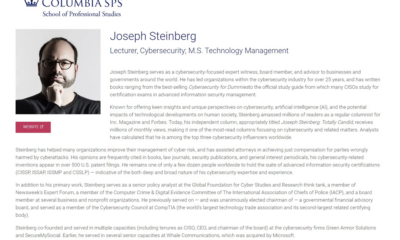Why Your Business Needs a Cyber Security Consultant or Cybersecurity Specialist
Securing Success: The Crucial Role of a Cybersecurity Specialist in a Growing Business
Human society is increasingly dependent on computer systems and the data housed and utilized within IT (information technology) infrastructure. While technological advances have, in some ways, allowed humans to enjoy an unprecedented quality of life, they also create significant risks. Likewise, information systems have allowed businesses to experience tremendous growth – today’s businesses face threats that, only a few decades ago, were the subject of solely science fiction books and movies. Cyberattacks, which not long ago were launched primarily by mischievous and/or curious teens seeking a thrill, are today a tool in the arsenal of organized crimes and nation-states employing armies of hackers.
Why Growing Businesses Require Cybersecurity Expertise
The coupling of increased reliance on technology, with the advances in attacker capabilities, means that today’s companies face far greater danger from cyberattacks; attacks can even threaten the viability of a going concern. As such, the role of a cyber security advisor has become paramount in ensuring the success and sustainability of today’s businesses.
When it comes to growing businesses, the need for a cyber security advisor is of even greater importance than it is in the general world of businesses at large. With growth inevitably comes the need for new systems, bigger networks, greater complexity of IT infrastructure, larger numbers of employees, new processes and procedures, more physical locations, increased visibility, a larger and more diverse set of business partners, larger budgets (which criminals like so they can demand larger ransoms after ransomware attacks), etc.
At the same time as the growing business’s cybersecurity needs grow, its personnel are often overwhelmed with day-to-day matters – leaving inadequate time to address the aforementioned changes, and, sadly, sometimes resulting in potentially catastrophic danger if an external cyber security advisor or group of cybersecurity advisors are not brought in to help.
The Rising Threat Landscape: Complexity
With each passing day, the cyber threat landscape becomes more sophisticated, complicated, and aggressive. Two generations ago, cybersecurity was often something that was “part” of someone’s job – a person tasked with managing corporate networks might also have been the primary person responsible for securing them. Today, however, when it comes to sizeable businesses, it is all but impossible for someone to properly oversee cybersecurity while performing another job. There is simply too much to know, too much to do, and too many developments with which to keep up. In fact, cybersecurity teams that are focused on maintaining cybersecurity often do not have the resources (especially time) to stay abreast of emerging threats, or to think strategically. As a result, even organizations with significant cybersecurity teams are often in dire need of a cybersecurity advisor, or even a group of cybers security advisors.
The Cyber Security Advisor
Cybersecurity is a complex field, in which experience and knowledge play a huge role in terms of determining success.
So, as a New Yorker, let me say it bluntly:
If you were gravely ill you would see a doctor who specializes in whatever illness was threatening your well being.
If you were being audited by the IRS, and suspected of tax fraud, you would engage an appropriately trained and experienced accountant.
If you were charged with a serious crime, you would employ an attorney to help defend yourself.
In none of the aforementioned three cases would any rational person try to “wing it” alone.
When it comes to cybersecurity the same is true – you need a cyber security if you want to competently address cyber risk.
The Rising Threat Landscape: Consequences
As humans continue to become increasingly reliant on technology – and as computer systems and electronically-stored information continue to play a greater and greater role in essentially every aspect of our lives – the potential damage that a cyber attack can inflict continues to grow. Today, cyber attacks can not only cause financial disasters, they can literally kill people.
Likewise, it is common knowledge that, today, not only are cyber risks diverse and ever-present, but, hackers, cybercriminals, and other malicious actors are constantly devising new techniques to exploit vulnerabilities in corporate digital infrastructure – leading to a reality today in which many new attack mechanisms are created literally every single day.
Furthermore, for many businesses, when it comes to cyberattacks, the stakes could not be higher.
As an organization accumulates valuable data, expands its network, and increases its online presence, it becomes a more lucrative target for cybercriminals. Not only can criminals target it directly, they can exploit weaknesses at its business partners in order to steal resources or to inflict damage.
The repercussions of a successful cyberattack can be devastating, ranging from financial losses and reputational damage to legal consequences. As a result, there can be tremendous value to having an outside cybersecurity specialist step in to help advise the organization and its leadership regarding safeguarding the digital assets of the organization.
Proactive Risk Mitigation
One of the primary responsibilities of a cybersecurity specialist helping a growing business is to help the organization adopt a proactive approach to cyber-risk mitigation. There is great value in being proactive: rather than reacting to threats after they occur, organizations can employ advanced tools and strategies to identify and address vulnerabilities before such can be exploited. Often, getting to such a point involves an external expert helping the organization plan and execute regular security assessments, penetration testing, and vulnerability scans to identify potential weaknesses in the organization’s policies, procedures, and systems.
Moreover, a cybersecurity specialist plays a crucial role in establishing robust security policies and protocols. This includes defining access controls, implementing encryption measures, and ensuring that employees are educated about best practices for cybersecurity. By taking a proactive stance, these specialists contribute significantly to the overall resilience of the business against cyber threats.
Protecting Sensitive Data
In an age in which data is often considered the lifeblood of an organization, protecting sensitive information is paramount. This is particularly true for businesses that handle PII (Personal Identifiable Information) or other customer data, financial records, and/or proprietary information and sensitive intellectual property. A cybersecurity specialist is instrumental in designing and implementing measures to safeguard these types of valuable data from unauthorized access, theft, or manipulation. The cybersecurity advisor can help the company plan – and can help oversee the company actually implement – methods of achieving necessary levels of security and risk mitigation.
Cyber security advisors not only help safeguard the interests of the growing business, but also help it strength its reputation by fostering trust among clients and partners.
Ensuring Regulatory Compliance
The regulatory landscape for cybersecurity is continually evolving, with governments and industry bodies enacting increasingly stringent measures to protect consumer data and privacy – both in terms of proactive security requirements and reactive disclosures after cybersecurity incidents.
A cybersecurity specialist advising a growing business is responsible for staying abreast of relevant regulations and working with corporate attorneys and compliance team members to help ensure that the organization complies with all relevant laws.
Failure to comply with cybersecurity regulations can result in severe consequences, including hefty fines and legal actions. Therefore, a cybersecurity specialist not only helps shield the organization from external threats, but from government-related consequences thereof.
Incident Response and Crisis Management
Even if it were armed with the “best possible cybersecurity protection measures” (if such a thing even existed), a computer system is never entirely immune to compromise.
Cybersecurity advisors, therefore, can help companies plan assemble and test an effective incident response and crisis management plan. If put into place, such plans can sometimes prevent minor incidents from becoming full-blown disasters.
Cybersecurity specialists often work hand-in-hand with other departments, such as legal and public relations, to coordinate a cohesive response. Clear communication with stakeholders, clients, and the public is essential to managing the aftermath of a security incident. The expertise of a cybersecurity specialist extends beyond preventing breaches to mitigating their consequences and facilitating a swift recovery.
Continuous Monitoring and Adaptation
In the dynamic realm of cybersecurity, the landscape is constantly shifting. New threats emerge, and cybercriminals continually refine their tactics. A cybersecurity advisor who is working with a growing business must, therefore, ensure that the business has a method of engaging in continuous monitoring and adaptation. Depending on numerous factors, a cybersecurity advisor might recommend that the business outsource some functions to MSSP (managed security service providers) or other MSPs (managed service providers) – the reality is that many growing business do not have the capability to, on their own, stay abreast on the latest cybersecurity trends, emerging threats, and relevant advancements in protective technologies. In any event, the cybersecurity advisor should help ensure that the business can adapt to emerging risks to itself.
What Makes a Great Cybersecurity Consultant?
There may not be any official list of formal qualifications as to what makes someone suitable to be an external cybersecurity advisor. But, clearly, having many years of relevant experience is of critical importance, as is the ability to communicate with business managers and technology personnel alike. Likewise, relevant university degrees and certifications (e.g., CISSP, ISSMP, etc.) can prove valuable as well.
Conclusion
The cybersecurity teams at growing businesses are often overwhelmed “fighting fires” – engaging an experienced cyber security advisor can help ensure that the business remains proactively vigilant, and may dramatically improve its chances of both repelling cyberattacks, as well as in minimizing the damage from any successful breaches. As time passes, cyber risks continue to grow, and the need for such external advisors does the same.













 CyberSecurity for Dummies is now available at special discounted pricing on Amazon.
Give the gift of cybersecurity to a loved one.
CyberSecurity for Dummies is now available at special discounted pricing on Amazon.
Give the gift of cybersecurity to a loved one.